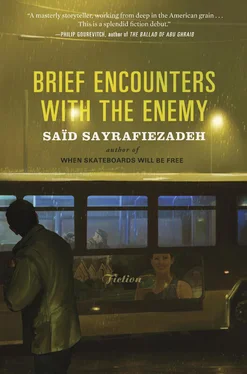Meanwhile, they made quick work of the American Revolution, the French Revolution, the Victorian Era, the Great Famine. Decades fell by the wayside. Their collective rigor and acumen were impressive. They wrote thoughtful, insightful essays about the reasons one million people had to starve to death. Their grammar was excellent, their spelling perfect. I could find no fault. The twentieth century loomed. It wasn’t until the Civil War that I managed to bog them down. War made their shoulders slump and their eyes glaze over. I punished them all the more for it. I spent whole classes standing at the front of the room, reading aloud from eyewitness accounts about Harpers Ferry and Bull Run—“Yonder down below, I descried a figure …”—trying to draw subtle, meaningful parallels to our present. Other times I copied long passages verbatim from the textbook onto the chalkboard, and as I copied, they copied. For an hour the only sounds in the classroom were the scraping of chalk and pencil and the sprinklers going shuck, shuck, shuck . On Thursdays they read aloud, on Fridays they read to themselves. On Mondays I turned obscure. “Who was General Zollicoffer, Chloe?” Chloe didn’t know. Chloe must memorize. “Where was the Battle of Pea Ridge, Trevor?” Trevor must study more.
“History is dead,” I said one day, apropos of nothing. “The past doesn’t exist.” I slammed the textbook closed for emphasis. The idea had come into my head fully formed. I thought it sounded profound, but the students looked weary. I opened the jar of candy on my desk and took out a handful. They had not had any in quite a while. I jiggled it in my hand as if considering. They stared at the bounty. I went from desk to desk, slowly giving one colorful piece to each student.
The enemy sometimes gives spontaneously and for no apparent reason.
They unwrapped their treats reflexively. They stuck them in their mouths. They waited for the bell to ring. They thought of Mrs. Tannehill.
It was during the Gilded Age that Dr. Dave showed up one morning unannounced. I was content with the Gilded Age. I had slowed the class perfectly, and with summer vacation approaching, we would have enough time to dip a toe into the twentieth century. That was all we needed to do in order to say we had done it. Then they could go on to seventh grade.
“Is it okay if I sit in today, Mr. Mattingly?” Dr. Dave asked. There was a hint of agenda in his voice.
“Of course it is,” I said. But I was ill prepared for observation. I made a grand sweep of my arm toward a desk in the back, as if my hospitality were immense.
I instructed the class to welcome Dr. Dave and they obliged mechanically: “HEL. LO. DOC. TORRRRRR. DAY. VE.” I scanned my students’ faces, trying to determine who among them had betrayed me. Someone no doubt had said something to their parents, who had called Dr. Dave. He had decided to come investigate for himself. The first thing he was sure to notice was the jar of candy on my desk. It glowed multicolored and bright.
He took a seat in the back row with his blue jeans. He was too large for the desk and he crossed his legs, trying to find purchase. He waited. The students waited. They knew something was amiss. They sensed my predicament. The enemy was being watched. Crimes would be revealed. As the bromide goes, the enemy of your enemy is your friend. Dr. Dave may very well have been the students’ enemy too. He had it in him. I had observed him once bring to tears an eighth-grade girl who’d made the mistake of referring to him as “Mister.” “Good morning, Mr. Dave.”
“I worked very hard for my doctorate, young lady,” he’d explained, inches from her face.
So we stepped lightly, the students and I, we groped for détente.
I loosened my tie and smiled. They smiled in return. I asked if they had plans for the weekend. They murmured some response.
With small talk depleted, I broached the subject of the Gilded Age. “Who here can tell me about the Gilded Age?”
There was a great, wide silence. I had overwhelmed them with too broad a question. They couldn’t have responded if they had wanted to. My technique had ignored the principles of how a young mind was equipped to think. Begin with relatable details, work toward larger concepts, expand outward into interpretation. It took everything I had not to glance in the direction of Dr. Dave. It took everything I had not to open the jar of candy.
“Who here can tell me,” I tried again, “about the life of Cornelius Vanderbilt?” Again silence. I had whittled the era down to the size of one human figure, though I wasn’t sure whether the students would have given me an answer even if they had one.
The enemy was hunted. The enemy was cornered. The enemy would capitulate. Now was not the time to show mercy.
It was warm in the classroom and I was beginning to sweat. To buy time, I took off my jacket and hung it on the back of my chair. I was sure that patches of sweat were visible around my armpits. One of the drawbacks about teaching in a quaint one-hundred-year-old building was that no provision had been made for air-conditioning. When the temperature rose, we suffered for it. The best you could hope for was that George the janitor would bring you a fan. Outside, the sprinklers toiled over the baseball field, but the grass was turning brown. Grass all over the city was turning brown. Rain was what was needed.
On the last day of the school year, Dr. Dave summoned me into his office. “Can I have a word with you, Jake?” is how he asked. I’d been expecting something of this sort but hadn’t prepared an able defense.
His feet were on the desk when I walked in and his diplomas were on the wall. He was dressed in a black suit with cuff links in the shape of mortarboards. Today was graduation and presently he would be standing onstage handing eighth graders their diplomas, intoning to each, “Give your best, get your best.”
It was strange to see him in a suit, and he looked severe. Severe like a magistrate. I took a seat across from him and waited for what no doubt would be an unfavorable verdict. He was dressed to inflict maximum punishment.
“I have a proposition for you, Jake,” he said without preamble. Then he launched into a strange and roundabout story — interrupted periodically by the ringing of his phone — that had nothing to do with my lack of pedagogy.
He was looking for a house-sitter.
Now that the war was over—“Thanks to you, Jake”—he would be doing some traveling. He was going to see the world. He and his wife. They were leaving in a few days. Day after tomorrow, actually. He had lined up a house-sitter — a friend of a cousin — but that person had fallen through at the last minute because he was young and irresponsible. Dr. Dave had thought of me. I had popped into his head. Would I be interested? There was no money, of course. “But I’m sure you could use your own sort of vacation, Jake.” We laughed together at this. He knew my salary. He probably knew the size of my apartment. All that was required of me was to collect the mail and water the garden. Other than that, I would have the run of the house, including the forty-two-inch high-definition television.
“Do you want to think about it?” he asked. No, I didn’t want to think about it.
I called Fred the subletter the next day. This time he was happy to hear from me. He showed up with a dozen boxes and the first month’s rent in cash. My mother was there, helping me pack. It was her day off from answering phones and she had nothing better to do. There wasn’t much to pack except clothes.
“We’ll be out of your hair in no time,” she told Fred. She was always apologizing for things that didn’t require apology.
“If you forget anything,” Fred said to me, “you’re always welcome to come back.”
Читать дальше












